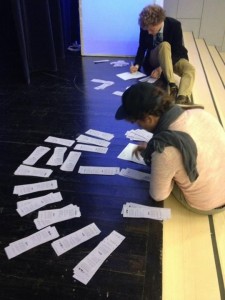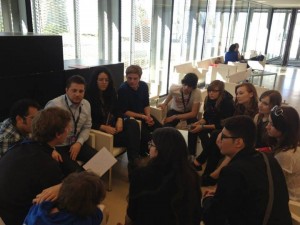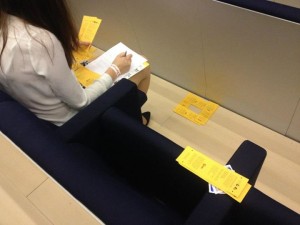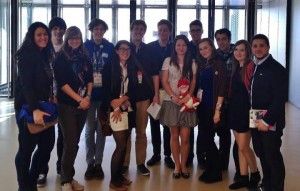Two very active AEGEE members, Alin-Florin Calin and Thomas Leszke, are leading the new Election Observations Project that will get AEGEE involved again in election observation missions at our local and national level. A first open call was sent on stage during Autumn Agora Zaragoza 2013 and proved to be very successful, with about 20 AEGEEans attending the first meeting. Alin-Florin Calin has talked to The AEGEEan about this new initiative.
The AEGEEan: How did the idea of the Election Observation Project (EOP) come up?
Alin-Florin Calin: Several aspects led to this project. During my term as Liaison Officer towards the Organisation for Security and Co-operation in Europe (OSCE) I had to deal several times with many Election Observation Missions conducted by them. Miguel Gallardo, the Projects Director of AEGEE-Europe, asked me to try to involve AEGEE in them. I was particularly interested in the observation elections due to my legal background of my studies. Moreover, before my term as Liaison Officer, I was part of the Juridical Commission for two terms and dealt, a very big part of the time, with elections procedures.
However, the decision to establish this project in our International Politics Working Group (IPWG) was taken in October 2013 at Human Dimension Implementation Meeting (HDIM), the largest conference on human rights and democracy in Europe, where I led a delegation of seven AEGEEans. The sessions and side debates there encouraged us to implement this project in AEGEE.

I have heard that you got a very positive feedback from the OSCE. Which was their advice regarding this project?
The OSCE is trying to enhance youth involvement. AEGEE was the only youth NGO and the youngest delegation there. I think for them it was new to have such young participants, but they were also very happy to welcome us. This year we had a very promising meeting with officers from the Democratic Government and Gender Unit, which has a former AEGEE member as the head of the Office. During the HDIM it became clearer that it is almost impossible to attend EOMs as an organisation, since member state send their national observers to an EOM. Some of them contain about ten observers, other like the last EOMs in Ukraine 600. So the officers advised us to start training in our organisation, to do internal election observations along with online courses and to encourage our members to apply through their national systems for EOMs. Having internal election observation is something unique in youth organisations as far as I know but its is a crucial part of the principals of democracy. In long term we will see how successful we will be in getting involved in really serious political tasks but for now we want to gain experience. Next year we are planning to cooperate with the OSCE, to have officers to our upcoming statutory events and to have a side event at the next HDIM 2014.
You had a first meeting with interested people in Zaragoza. Did you reach many motivated members?
The first meeting was very promising. On the spot we had a team of 20 members, created a communication platform and the mailing list for the Election Observation Project, where we exchange information and organize ourselves. Now we have a team with more than 30 members and are still looking for the last interested people in the network before the recruitment period finishes next week.

Alin, you were also observing the election process during the Agora. What can you tell us about it?
The Agora was a couple of weeks after our HDIM attendance and I agreed with Thomas Leszke, who has been very active in the team from the very first moment, to start searching for interested people at the Agora. But before the first ballot counting, where Thomas candidated for the Mediation Commission, Alberto Cuesta Noriega from the chair team asked me if I want to help again in counting ballots. In that moment I realised that I have to grab this chance and try to see how election observation could look like in AEGEE. So I took the OSCE material I had with me, went through them again and after an agreement with the Chair Person, Alla Resheten, I was already observing. Meanwhile Thomas made an open call on the stage for having a meeting after the session and that was the beginning. All this happened within our morning plenary session. I identified a couple of points that should be improved and will be communicated to the Chair Team and the Juridical Commission. I didn’t present a report since these observations were just a test and not the whole procedure was observed. It’s important to mention that for election observations many circumstances have to be taken into account such as: the Agora Working Format, the election participation, the Internet access for e-voting, procedures during Pritania and further aspects, which are the foundation for a democratic process in AEGEE.
At the end of the observed elections we will present a report including recommendations how to improve democracy in AEGEE. So you see, this is a totally new way to be involved in our decision-making and voting procedures in the network and to improve.

AEGEE has taken part in other EOMs before. Why is that important for the organisation?
As I mentioned I see election observation as a key issue for democracy, peace and security. We have the possibility to train members in AEGEE and give them the tools to carry these principles in the international arena and to get involved in domestic election observations. I think we are also predestined to experience the new voting technologies. It is idealistic, but our network offers the best place to train young people and provide knowledge about the fundamentals for democracy and the rule of law. My vision is to inspire members to get more involved into elections, democracy and political participation.
Which are the first steps that the EOP will take?
After we will have our concept and all interested people from our open calls, we will start creating smaller groups with special tasks. We want to cooperate with the Y Vote 2014 team and get involved on national level in the European Parliament Elections on 25 of May 2014. We aim to facilitate AEGEE members’ participation in the organisation of electoral processes in their own countries. For this we need to find out the conditions of relevant countries. The first task we are working on is for members to find out the following things for the countries they are familiar with – the basics of the political and legal system:
- Who is responsible for the coordination of that country’s participation in international EOMs?
- Who is eligible to participate in such missions on behalf of that country?
- What are the criteria and procedure for becoming a qualified election observer on behalf of that country or international entity?
Are you planning to involve AEGEE locals on it?

For now we are still gathering ideas and drafting a plan how to establish election observation in AEGEE. Having locals involved is for sure one possibility that we actually would like to put into practise.
Why would you encourage AEGEE members to take part in this project?
Firstly because you may have the unique opportunity to get closer to international election observation missions and secondly because you will learn a lot about how democracy really works and what the problems are. Moreover you can make a great contribution to making AEGEE more democratic.
If you want to join the Election Observation Project of the IPWG in AEGEE, subscribe to EOP-L@lists.aegee.org , join the Facebook group “Election Observation in AEGEE” or contact the project managers under alin-florin.calin@aegee.org or thomas.leszke@aegee.org
Written by Anna Gumbau, AEGEE-Barcelona

